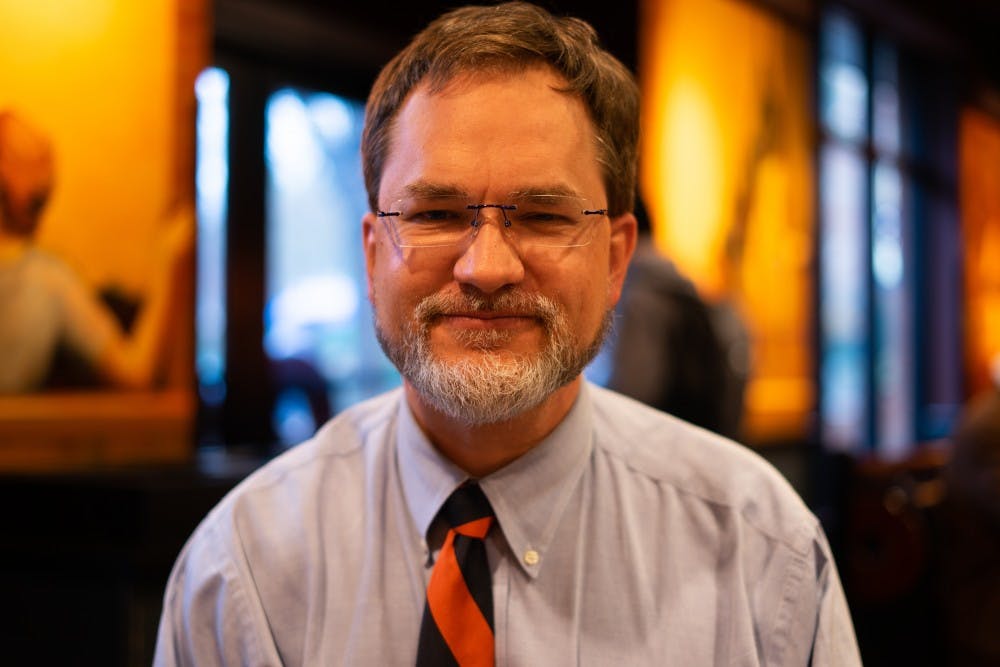Brian Pinkston, project services associate director for planning at facilities management for the University, announced his campaign for Charlottesville City Council Feb. 6 with the slogan — “A Voice for the Common Good.” Pinkston is one of several candidates seeking a nomination in the Democratic Primary for City Council — which is June 11.
“My campaign theme is about this idea of the common good, seeking the common good and realizing that we are all interrelated and connected,” Pinkston said in an interview with The Cavalier Daily.
Three seats on the City Council are up for grabs in 2019 — those currently held by Democratic councilors Kathy Galvin, Mike Signer and Wes Bellamy. Galvin, owner of Galvin Architects since 1993, was first elected to the Council in 2011. Signer, a local attorney, has held a seat on the Council since 2016 and served as mayor until 2018. Bellamy, a local educator and community organizer, was first elected to the Council in 2015 and served as vice mayor until January 2018.
In addition to Pinkston, three other individuals have formally declared their candidacies as Democratic contenders for the Charlottesville City Council, including local activist and community organizer Michael Payne, Region Ten board member Sena Magill and local criminal defense attorney Lloyd Snook.
Payne, who co-founded Indivisible Charlottesville in 2017 — a political advocacy organization focused on progressive policy reform — has served as an organizer with the Charlottesville chapter of the Democratic Socialists of America. Payne makes frequent appearances before the City Council to speak in favor of a variety of progressive policy issues, especially affordable housing.
Magill is a longtime Charlottesville native, having lived in the City since she was 18 years old. From 1999 to 2010, she served as the director of Intensive Services for Region Ten — a local and regional governmental agency which serves to provide assistance and services to those with mental illnesses or disabilities.
Snook announced his candidacy in January, writing that his campaign will have three central goal — restoring order in Charlottesville’s government, confronting the challenges of a growing city such as rapid population increase and urban development, and addressing issues that contribute to increased incarceration rates, such as affordable housing.
Pinkston hopes to foster the common good through both more immediate projects like affordable housing, and long-term efforts like addressing global warming and improving schools in Charlottesville. To address the city’s affordable housing crisis, Pinkston seeks to first examine the existing housing options.
“I think we need to have targeted investments in bringing our existing public housing up to scratch because it is in disgraceful condition,” Pinkston said.
Pinkston also believes a reevaluation of zoning laws is essential in creating solutions to the housing issue. Additionally, Pinkston felt optimistic about the city’s willingness to address climate change after it was discussed at a recent joint meeting between City Council and the Albemarle Board of Supervisors. He is interested in asking more questions about existing zoning requirements involving ethical energy use, and in looking to the effects of global warming on other areas in the state, such as Norfolk, Va.
Paramount to Pinkston’s campaign is his focus on improving the Charlottesville schools, as he believes progress towards racial equity in Charlottesville can be achieved if the school systems are upgraded.
“It's very easy to sort of talk in pious terms about racial justice, but for me what that comes down to practically is that the school board has requested $55 million of investment in new facilities,” Pinkston said. “They’ve requested $3.5 or $4 million in budget [increases to] the teachers’ salaries and bonuses.”
According to Pinkston, it is essential that Charlottesville City Council grants the school system that money, even if it means delaying other projects because of the impact that donation could have on future generations.
Pinkston, who is a current employee of the University, completed a PhD in philosophy at the University in 2012. During the process of getting his PhD, Pinkston worked in facilities management to support his family. He believes his humanities background and management experience will serve him well on City Council.
“Every given project, whether it was in manufacturing, in my dissertation, or in what I do now with construction — every project has a different group of people, different constraints and parameters, and I believe that experience will serve me well when it comes to problem solving on City Council,” Pinkston said.





